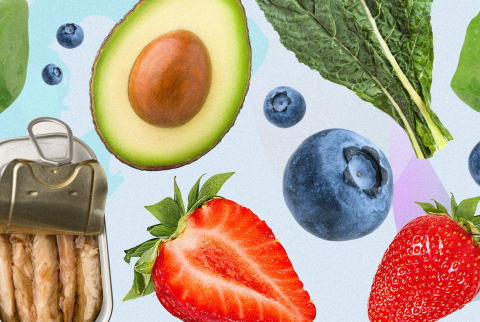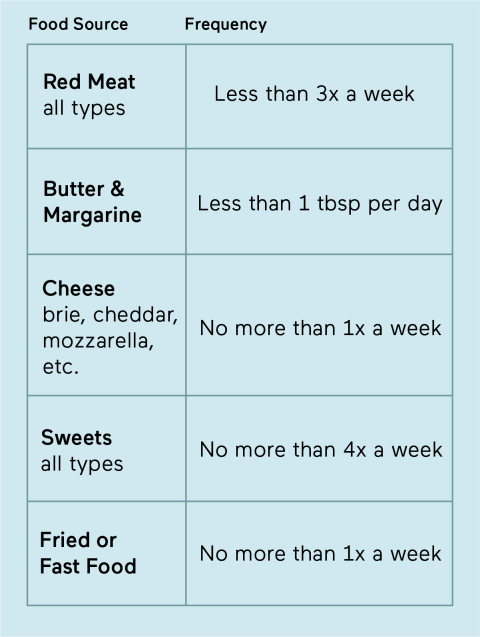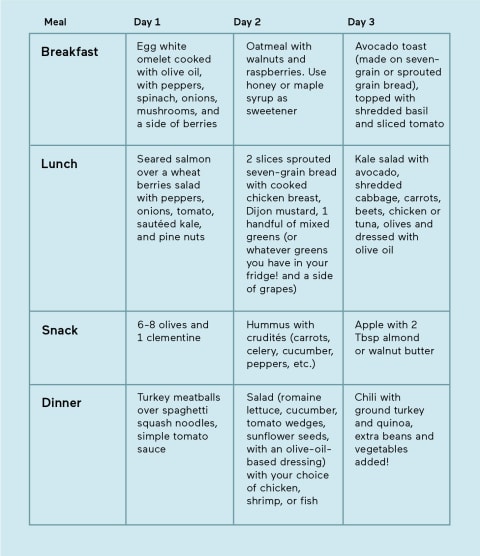Despite having benefits for our aging mind (Note the play on words here: It technically stands for the Mediterranean-DASH Intervention for Neurodegenerative Delay, but the health benefits are brain-heavy), it’s not only limited to the aging population. The Mediterranean diet is based on the traditional cuisine in the countries that border the Mediterranean Sea (it’s frequently recommended by doctors, medical institutions and hospitals, and it was even voted No. 1 best diet for overall health according to U.S. News and World Report in 2022). When following the Mediterranean diet, you’re encouraged to eat vegetables, fruits, whole grains, herbs, spices, and healthy fats daily, along with lean proteins such as fish and poultry; it’s also recommended to cut back on red meat and dairy. The MIND diet is also based on the DASH diet, which stands for Dietary Approaches to Stop Hypertension; this diet is geared toward lowering or controlling high blood pressure. When following this diet, it’s recommended to consume foods lower in sodium while increasing foods that are higher in other electrolytes, such as potassium, calcium, and magnesium. This diet also emphasizes consuming more whole grains, vegetables and fruits, low-fat dairy, poultry and fish, and (similarly to the Mediterranean diet) recommends limiting dairy and red meat. For instance, while all vegetables are permitted on the MIND diet, it places emphasis on leafy green vegetables. A few star veggies include spinach, kale, and collard greens, which have been found to be particularly beneficial for brain health due to their source of folate, vitamin E, and carotenoids. Research suggests that one serving a day (1 cup of raw or ½ cup cooked) of these vegetables may slow brain aging2. It’s recommended to have six servings of greens a week on this diet, with the remaining vegetable intake coming primarily from nonstarchy vegetables like these: This diet emphasizes eating berries—specifically blueberries and strawberries—as the primary source of fruit and doesn’t emphasize any other fruit. The reason for the MIND diet’s berry obsession? Studies have shown that individuals who ate the most berries had the slowest rates of cognitive decline3. That said, the MIND diet suggests two or more servings of berries a week (perfect guidelines for a yummy antioxidant smoothie). Nuts and fish are also staples of the MIND diet—nuts are an excellent source of vitamin E, which is a key nutrient for brain health. The MIND diet recommends five servings per week of dry-roasted or unsalted nuts. Research suggests that one serving of fish a week may reduce cognitive decline4. That research doesn’t specify any type of fish, but the MIND diet suggests fish highest in omega-3 fatty acids, like salmon for instance. The emphasis on so many fruits, vegetables, and lean proteins makes this diet a super-nutrient-packed eating plan in itself. Another study found that women who consume blueberries, strawberries, and blackberries may delay cognitive decline by up to two years3 (which only strengthens the reason the diet encourages berries, as previously mentioned). Because the MIND diet is naturally low in saturated fat and cholesterol, it’s also suggested to reduce the risk of dementia as well as Alzheimer’s disease, which studies show is involved in the blood-brain barrier and is involved in the pathology of both diseases6. Generally, the MIND diet also appears to reduce amyloid plaque production7 (which some research has found may be behind Alzheimer’s). All vegetables contain healthy nutrients, but the richer in color, the more antioxidants, according to research. Upon commencing the MIND diet, people may find that their blood sugar has improved due to the high-fiber, protein-packed, anti-inflammatory foods10. Breaking the diet down into what foods you should include more of and how to combine them together can help you execute the diet in an easier way. Here’s a list of approved and prohibited foods (and how much you should eat). A note: These are the minimum servings to try to meet, especially for the vegetables. If you can include more veggies, that’s always a good idea! The emphasis on fruits and vegetables, healthy fats, and less processed and refined foods is a great way for most of us to be eating every single day. That said, any time you start a restrictive diet, it’s always a good idea to check in with your doctor. Here’s to optimized brain and heart health—feel free to toast to good health with one glass of red wine as you dine with family and friends (a practice that’s always Mediterranean-diet approved!)







